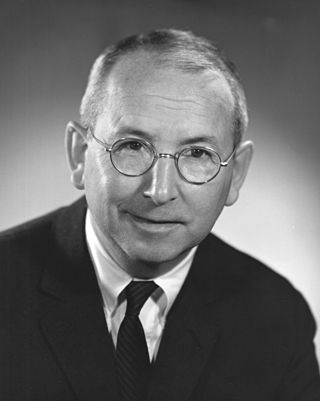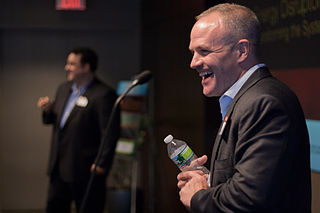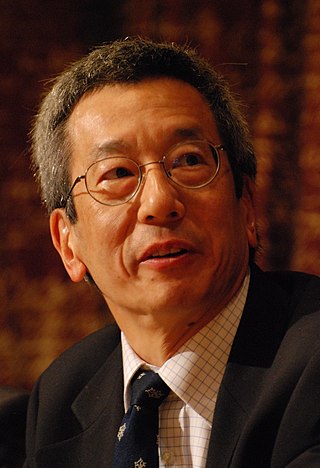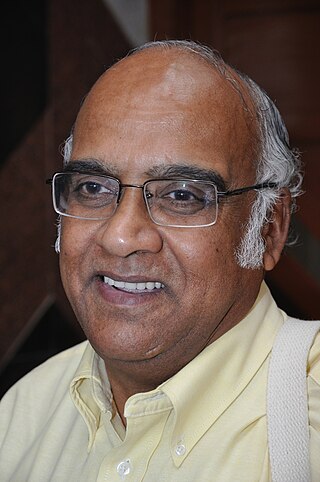
The Conference and Workshop on Neural Information Processing Systems is a machine learning and computational neuroscience conference held every December. Along with ICLR and ICML, it is one of the three primary conferences of high impact in machine learning and artificial intelligence research.

Paul Donald MacLean was an American physician and neuroscientist who made significant contributions in the fields of physiology, psychiatry, and brain research through his work at Yale Medical School and the National Institute of Mental Health. MacLean's evolutionary triune brain theory proposed that the human brain was in reality three brains in one: the reptilian complex, the limbic system, and the neocortex.

American Jewish University (AJU) is a private Jewish university in Los Angeles, California. It was formed in 2007 from the merger of the University of Judaism and Brandeis-Bardin Institute.

Jay D. Keasling is a professor of chemical engineering and bioengineering at the University of California, Berkeley. He is also associate laboratory director for biosciences at the Lawrence Berkeley National Laboratory and chief executive officer of the Joint BioEnergy Institute. He is considered one of the foremost authorities in synthetic biology, especially in the field of metabolic engineering.
Mriganka Sur is an Indian neuroscientist. He is the Newton Professor of Neuroscience and Director of the Simons Center for the Social Brain at the Massachusetts Institute of Technology. He is also a Visiting Faculty Member in the Department of Computer Science and Engineering at the Indian Institute of Technology Madras and N.R. Narayana Murthy Distinguished Chair in Computational Brain Research at the Centre for Computational Brain Research, IIT Madras. He was on the Life Sciences jury for the Infosys Prize in 2010 and has been serving as Jury Chair from 2018.

Kantilal Vardichand "Kanti" Mardia is an Indian-British statistician specialising in directional statistics, multivariate analysis, geostatistics, statistical bioinformatics and statistical shape analysis. He was born in Sirohi, Rajasthan, India in a Jain family and now resides and works in Leeds. He is known for his series of tests of multivariate normality based measures of multivariate skewness and kurtosis as well as work on the statistical measures of shape.
Fernando Nottebohm is a neuroscientist. He serves as the Dorothea L. Leonhardt Professor at Rockefeller University, as well as being head of the Laboratory of Animal Behavior and director of the Field Research Center for Ecology and Ethology.

George F. Koob is a Professor and former Chair of the Committee on the Neurobiology of Addictive Disorders at the Scripps Research Institute and Adjunct Professor of Psychology, Psychiatry, and Skaggs School of Pharmacy and Pharmaceutical Sciences at the University of California, San Diego. In 2014 he became the director of the National Institute on Alcohol Abuse and Alcoholism.

Roger Yonchien Tsien was an American biochemist. He was a professor of chemistry and biochemistry at the University of California, San Diego and was awarded the Nobel Prize in Chemistry in 2008 for his discovery and development of the green fluorescent protein, in collaboration with organic chemist Osamu Shimomura and neurobiologist Martin Chalfie. Tsien was also a pioneer of calcium imaging.
The Sir James George Frazer Memorial Lectureship in Social Anthropology is a British academic lecture series.
Nancy Jane Kopell is an American mathematician and professor at Boston University. She is co-director of the Center for Computational Neuroscience and Neural Technology (CompNet). She organized and directs the Cognitive Rhythms Collaborative (CRC). Kopell received her B.A. from Cornell University in 1963 and her Ph.D. from Berkeley in 1967. She held visiting positions at the Centre National de la Recherche Scientifique in France (1970), MIT, and the California Institute of Technology (1976).
Michael J. Shelley is an American applied mathematician who works on the modeling and simulation of complex systems arising in physics and biology. This has included free-boundary problems in fluids and materials science, singularity formation in partial differential equations, modeling visual perception in the primary visual cortex, dynamics of complex and active fluids, cellular biophysics, and fluid-structure interaction problems such as the flapping of flags, stream-lining in nature, and flapping flight. He is also the co-founder and co-director of the Courant Institute's Applied Mathematics Lab.
Merrill Brian Maple is an American physicist. He is a distinguished professor of physics and holds the Bernd T. Matthias Chair in the physics department at the University of California, San Diego, and conducts research at the university's Center for Advanced Nanoscience. He has also served as the director of UCSD's Institute for Pure and Applied Physical Sciences (1995-2009) and its Center for Interface and Materials Science (1990-2010). His primary research interest is condensed matter physics, involving phenomena like magnetism and superconductivity. He has authored or co-authored more than 900 scientific publications and five patents in correlated electron physics, high pressure physics, nano physics, and surface science.

John M. "Jack" Carpenter was an American nuclear engineer known as the originator of the technique for utilizing accelerator-induced intense pulses of neutrons for research and developing the first spallation slow neutron source based on a proton synchrotron, the Intense Pulsed Neutron Source (IPNS). He died on 10 March 2020.

Susan G. Amara is an American professor of neuroscience and is the Scientific Director of the National Institute of Mental Health. Dr. Amara is an elected member of the National Academy of Sciences and a fellow of the American Association for the Advancement of Science. She is a Past-President of the Society for Neuroscience. Dr. Amara has a B.S. in Biological Sciences from Stanford University and a Ph.D. in Physiology and Pharmacology from the University of California, San Diego.

Swaminathan Sivaram is an Indian polymer chemist, inventor, institution builder and a former director of the National Chemical Laboratory, Pune. He is known for his pioneering work on alkylation of tertiary alkyl halides with trialkylaluminum and olefin polymerization and holds the highest number of US patents by an Indian working outside the US. He is a fellow of several significant professional organizations. The Government of India awarded him the fourth highest civilian honour of the Padma Shri, in 2006, for his contributions to Indian science.
John Barnabas (1929–1994) was an Indian evolutionary biologist, known for his contributions in the fields of Molecular Systematics and Evolution. He was a member of the Science Advisory Committee to the cabinet as well as the Department of Biotechnology of the Government of India. A Jawaharlal Nehru Fellow, Barnabas was also an elected fellow of the Indian Academy of Sciences, Indian National Science Academy and the National Academy of Sciences, India. The Council of Scientific and Industrial Research, the apex agency of the Government of India for scientific research, awarded him the Shanti Swarup Bhatnagar Prize for Science and Technology, one of the highest Indian science awards, in 1974, for his contributions to biological sciences.
Deepak Mathur is an Indian molecular and atomic physicist and was a Distinguished Professor at the Tata Institute of Fundamental Research. He has been the J C Bose National Fellow at the Department of Atomic and Molecular Physics at Manipal Academy of Higher Education (MAHE) and founding director of the UM-DAE Centre for Excellence in Basic Science at the University of Mumbai. Known for his research on molecular and biological physics, Mathur is an elected fellow of the Indian Academy of Sciences, Indian National Science Academy and The World Academy of Sciences. The Council of Scientific and Industrial Research, the apex agency of the Government of India for scientific research, awarded him the Shanti Swarup Bhatnagar Prize for Science and Technology, one of the highest Indian science awards, for his contributions to physical sciences in 1991. Amongst other awards, he has been the Royal Society's Guest Fellow at Oxford University and winner of the European Union's Erasmus-Mundus prize in optical science which he held at Imperial College London. Currently he is an adjunct professor at MAHE and is also learning to fly. His initial training was on a Grob G-115 2-seater training aircraft but he has now moved on to flying PA-28 4-seater aircraft.










